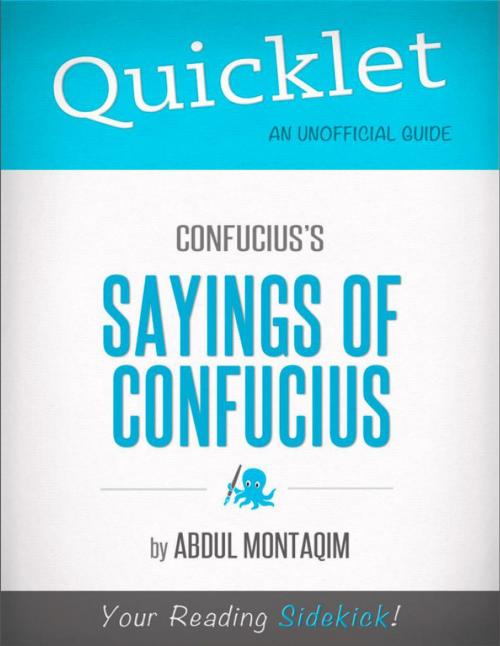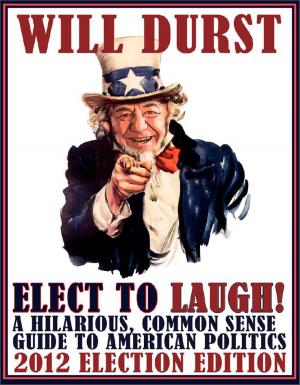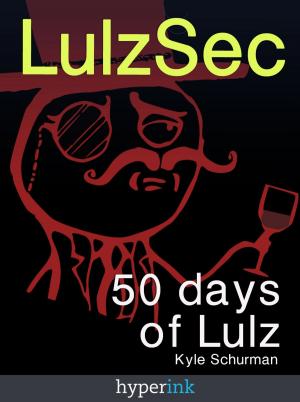Quicklet on Confucius's The Sayings of Confucius (CliffNotes-like Summary)
Nonfiction, Reference & Language, Study Aids, Book Notes, Art & Architecture, General Art| Author: | Abdul Montaqim | ISBN: | 9781614649595 |
| Publisher: | Hyperink | Publication: | February 24, 2012 |
| Imprint: | Hyperink | Language: | English |
| Author: | Abdul Montaqim |
| ISBN: | 9781614649595 |
| Publisher: | Hyperink |
| Publication: | February 24, 2012 |
| Imprint: | Hyperink |
| Language: | English |
ABOUT THE BOOK
Like many people out there, I sometimes visit quotations websites, just to read a few wise words, have my spirits lifted, and maybe get some ideas. And quotations by Confucius are always worth reading for their emphasis on human values and strengths.
Confucius was fundamentally a humanist, believing that we each shape our own destiny. His words of wisdom rarely, if ever, suggested that we give up control of our lives to any higher beings or unseen powers. He always insisted that we can achieve our goals through being humble, hard-working and wise.
One thing, however, that I think has stopped me from being overly enthusiastic about Confucius is that he does seem to dwell a lot on discipline and correct ways of behaviour, on ritual. And he seems to think a lot about working as part of a team, in a collective or something. But given that he lived at the time of Imperial China, that’s understandable.
MEET THE AUTHOR
Abdul Montaqim is a journalist, based in London, and has been working in the media since 1989. Among the more well known titles he has written for are The Guardian newspaper, Time Out magazine and the International Business Times website.
He has edited a number of local and community newspapers, magazines and websites, and has, over the course of his career, worked for some of the largest publishers in Europe, including Emap, LLP and Mirror Group Newspapers.
Abdul has also worked outside of the United Kingdom, moving to Abu Dhabi for a year to work on the first national daily newspaper in United Arab Emirates, The National; and he has consulted for media companies in Bangladesh, where he was born.
Abdul briefly worked for a New York-headquartered cable television channel called AsiaNet as a news editor, and realised that although he loves researching, writing and other "technical" parts of a journalist's job, he does not like presenting, preferring to be behind the camera or back in the studio.
In his spare time, Abdul likes to spend time with his family, cooking, eating, watching films, listening to music, reading and writing. When he goes out he likes to watch movies at the best cinemas, see live music performances, and eat at good restaurants. He also loves gardening, fishing and going for long walks.
EXCERPT FROM THE BOOK
Confucius was a teacher, politician, thinker and philosopher who lived during the days of what’s called Early Imperial China. It’s believed that he was born in the year 551 BC—that’s more than 2,500 years ago. His father was said to be a warrior who had had a number of successes in various battles and owned a fiefdom, although some sources say that he was actually a poor military officer and Confucius himself was brought up in poverty.
Nontheless, Confucius belonged to a social class that was positioned somewhere between common people and the old nobility of Early Imperial China. This particular group of people seemed to have been like the modern middle classes in the West, and made progress in life by acquiring knowledge and skills.
And although he had been a teacher and a student for a lot of his life, Confucius himself had apparently chosen a life in politics, and by the age of 53 he had worked his way up to the position of Justice Minister in Lu, one of the western provinces in ancient China.
Buy a copy to keep reading!
ABOUT THE BOOK
Like many people out there, I sometimes visit quotations websites, just to read a few wise words, have my spirits lifted, and maybe get some ideas. And quotations by Confucius are always worth reading for their emphasis on human values and strengths.
Confucius was fundamentally a humanist, believing that we each shape our own destiny. His words of wisdom rarely, if ever, suggested that we give up control of our lives to any higher beings or unseen powers. He always insisted that we can achieve our goals through being humble, hard-working and wise.
One thing, however, that I think has stopped me from being overly enthusiastic about Confucius is that he does seem to dwell a lot on discipline and correct ways of behaviour, on ritual. And he seems to think a lot about working as part of a team, in a collective or something. But given that he lived at the time of Imperial China, that’s understandable.
MEET THE AUTHOR
Abdul Montaqim is a journalist, based in London, and has been working in the media since 1989. Among the more well known titles he has written for are The Guardian newspaper, Time Out magazine and the International Business Times website.
He has edited a number of local and community newspapers, magazines and websites, and has, over the course of his career, worked for some of the largest publishers in Europe, including Emap, LLP and Mirror Group Newspapers.
Abdul has also worked outside of the United Kingdom, moving to Abu Dhabi for a year to work on the first national daily newspaper in United Arab Emirates, The National; and he has consulted for media companies in Bangladesh, where he was born.
Abdul briefly worked for a New York-headquartered cable television channel called AsiaNet as a news editor, and realised that although he loves researching, writing and other "technical" parts of a journalist's job, he does not like presenting, preferring to be behind the camera or back in the studio.
In his spare time, Abdul likes to spend time with his family, cooking, eating, watching films, listening to music, reading and writing. When he goes out he likes to watch movies at the best cinemas, see live music performances, and eat at good restaurants. He also loves gardening, fishing and going for long walks.
EXCERPT FROM THE BOOK
Confucius was a teacher, politician, thinker and philosopher who lived during the days of what’s called Early Imperial China. It’s believed that he was born in the year 551 BC—that’s more than 2,500 years ago. His father was said to be a warrior who had had a number of successes in various battles and owned a fiefdom, although some sources say that he was actually a poor military officer and Confucius himself was brought up in poverty.
Nontheless, Confucius belonged to a social class that was positioned somewhere between common people and the old nobility of Early Imperial China. This particular group of people seemed to have been like the modern middle classes in the West, and made progress in life by acquiring knowledge and skills.
And although he had been a teacher and a student for a lot of his life, Confucius himself had apparently chosen a life in politics, and by the age of 53 he had worked his way up to the position of Justice Minister in Lu, one of the western provinces in ancient China.
Buy a copy to keep reading!















